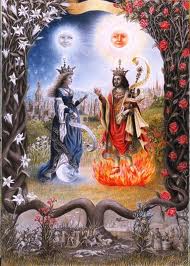 The ethical impeccability of the Sovereign archetype is not easily won or highly developed in everyone. A passion for justice, caring, equality, honesty, and morally responsible behavior are functions of experience, education, psychological maturity, economic security, and a “religious” attitude of reverence for the miracle and mystery of life. These qualities are rare in individuals who’ve endured persistent abuse and agonizing struggles for love, safety and survival.
The ethical impeccability of the Sovereign archetype is not easily won or highly developed in everyone. A passion for justice, caring, equality, honesty, and morally responsible behavior are functions of experience, education, psychological maturity, economic security, and a “religious” attitude of reverence for the miracle and mystery of life. These qualities are rare in individuals who’ve endured persistent abuse and agonizing struggles for love, safety and survival.
The more fortunate among us undergo a natural progression from youthful immersion in the unconscious maternal matrix, to an adolescent preoccupation with self, to caring about others as much as ourselves. This development is paralleled in the story of the human race.
In the early history of our species, as in the youth of the individual, the Sovereign was often projected onto the divine Creatrix, the Great Mother of life, and reverence for her species-preserving nurturance, combined with fear of her destructive potential, was the norm in collective thinking. In many parts of the world, trust in the imminence and benevolence of her human Beloved, the god-king, reduced anxiety, fostered peaceful relations, and restrained destructive tendencies for centuries at a time.
 In our adolescence, groups became more organized and attached to their unique identities, and in the manner of teen-aged gangs, some became threats to others. As the ego came to dominate the psyche, a dominator mentality co-opted entire civilizations, and fierce loyalty to a distant, partisan male God who waged war against the tribe’s enemies became the norm. Since then, the King archetype has largely ruled alone on Psyche’s throne. From there he still motivates our youthful struggles for independence and autonomy within and without.
In our adolescence, groups became more organized and attached to their unique identities, and in the manner of teen-aged gangs, some became threats to others. As the ego came to dominate the psyche, a dominator mentality co-opted entire civilizations, and fierce loyalty to a distant, partisan male God who waged war against the tribe’s enemies became the norm. Since then, the King archetype has largely ruled alone on Psyche’s throne. From there he still motivates our youthful struggles for independence and autonomy within and without.
Wherever the King’s will to power and resistance to change are obsessive, countless individuals suffer atrocities. But people who work to tame their instincts and minimize their ego’s obsession with him begin to remember and respect the Queen’s subtler virtues of love, forgiveness and relatedness.
In recent history, her passion for individual rights and shared authority has reemerged into collective consciousness in the form of various political experiments. In England, for example, monarchs had unlimited power until 1215 when the barons forced King John to sign the Magna Charta granting people certain civil and political liberties. Five hundred and fifty years later, this concept evolved into the American Constitution with its Bill of Rights.
 The growth of democracy is a natural consequence of evolving consciousness. As the Queen and King archetypes mature in enough individuals, groups grow less tolerant of hatred and injustice and more intent on balancing one-sided, hierarchical systems with caring and shared authority. This is why monarchies and dictatorships are giving way to republics and democracies. We can resist inner and outer change, but the ego can no more control maturing archetypes than it can the forces of Nature. Indeed, archetypes are forces of Nature.
The growth of democracy is a natural consequence of evolving consciousness. As the Queen and King archetypes mature in enough individuals, groups grow less tolerant of hatred and injustice and more intent on balancing one-sided, hierarchical systems with caring and shared authority. This is why monarchies and dictatorships are giving way to republics and democracies. We can resist inner and outer change, but the ego can no more control maturing archetypes than it can the forces of Nature. Indeed, archetypes are forces of Nature.
As Americans give thanks this holiday season for the freedoms and rights we enjoy, may we remember that we earned them by consciously integrating our inner Kings and Queens. Some may not be happy with the outcome of our recent election, but evolving archetypal forces in the collective psyche have made their priorities known and our country’s future depends on our ability to work together to heed their messages. Here is one of them:
“There cannot be true democracy unless women’s voices are heard. There cannot be true democracy unless women are given the opportunity to take responsibility for their own lives. There cannot be true democracy unless all citizens are able to participate fully in the lives of their country.” –Hillary Clinton, Secretary of State of the United States
Wishing us all a more conscious Thanksgiving.
You can purchase Healing the Sacred Divide at this Amazon link or www.Larsonpublications.com.

A Lesson on Aging
I’m so happy to be back in the mountains. I love the weather, the trees, the birds, the rushing creek, the flowering bushes. The beauty.




